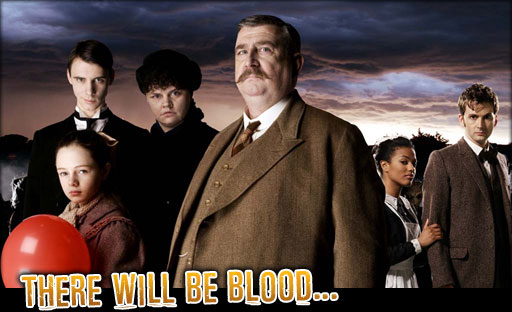
Aired 2 June 2007
‘The Family of Blood’ serves as the conclusion to the events depicted in ‘Human Nature’ and successfully finishes off what seems like the most polished and powerful two-parter of modern Doctor Who to date.
Though the events leading up to the climax and denouement are equally superb, it’s these ending moments that provide some of the most powerful moments in the long history of the programme. Baines’s narration over a montage of visuals depicting what the Doctor does to the Family after defeating them is chilling, and the notion that the Doctor was running away from them as an act of kindness rather than fear speaks volumes about the character. David Tennant usually puts such a friendly and jovial face on his incarnation, and so it’s easy to forget just how brutal the wrath of the Time Lord can be.
The Family of Blood is a strong addition to the line of Doctor Who villains, but Baines particularly is a strongly atypical villain, always emanating a sense of crazed danger with a slightly off speech pattern and a look of permanent semi-rage. Harry Lloyd does exceedingly well in the role once more, straddling the line of menace and caricature perfectly, and it’s eerily suiting that he would be imprisoned in time forever as a scarecrow, figures he had used to do his bidding earlier.
Unsurprisingly, there are several comments made about war, both about its futility and how it changes people. In particular, the common narrative of simply blaming the war on the misdeeds of of a few people is called in to question, blaming the core institution as much as anything else. The scene in which Baines haunts the school headmaster with visions of war from the future is particularly strong, especially as the headmaster powerfully retorts with how much he has been through and sacrificed for his country, earning him the right to train others for war as well instead of earning him the title of coward. The fact that he is training children is, of course, the difference, but everyone’s absolute faith in their bigger purpose is astounding and speaks to the era and patriotism on display.
The story also does well with its portrayal of race and the issues it raises during the time period. Instead of making this exclusively about Martha and Martha pointing out the error of their ways, ‘The Family of Blood’ uses race to point out the shortcomings of its characters, both good and bad. There are inherent prejudices in this time, and though the script remains mindful of its younger audience, it’s unafraid to show that everyone is subject to them while still wisely giving John Smith the most unoffensive line. Martha does manage to remain very strong throughout these barbs and comments, and she stays true to character without blowing anyone’s cover, but her decreed love of the Doctor still isn’t carrying much resonance at this time.
John Smith, realizing the danger to everyone around him, decides to sacrifice his very existence and love in order to once again become the Doctor. This revelation that he has opened the fob watch and regained his identity is masterfully played as Tennant- who has done so well to distinguish his two identical characters- walks aboard the Family’s ship, playing the fool as John Smith before suddenly dropping his guise and proving that he’s very much in control as the Doctor. He had given the Family the opportunity to do the right thing and to leave him alone, but his compassion certainly has its limits and the scope of power he exhibits is staggering.
Ultimately, though, this is the story of John Smith . As Nurse Redfern- again perfectly played by Jessica Hynes- notes, Smith ends up being the braver figure here as he willingly chose to die so that he could become the her once more. There’s a monumental amount of character work done in a very short period, and everyone is brought to life wonderfully well to make such an extraordinary circumstance seem plausible.
The final scene in which the Doctor and Martha visit an elderly Tim Latimer is easily one of the most satisfying endings to any episode in Doctor Who‘s long history, showing that he never forgot about them and they never forgot about him and wordlessly adding some much extra weight to the time the three spent together. It’s a perfect finish to a pretty much perfect two-parter.


January 14, 2021
[…] Gallifreyan Ramblings; Demon’s Run I & II; Spiralbound Notebooks; Tapetrade; Time Lord Archives; Junkyard View; Lyratek; Doctor Who Novels; Random Whoness; Twilight’s Warden; Doctor Who Reviews I & II. […]